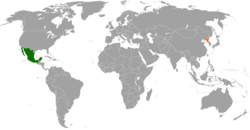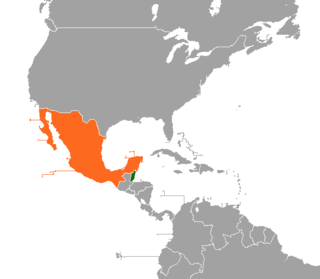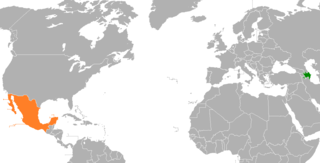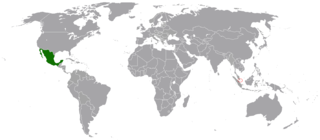 | |
Mexico | North Korea |
|---|---|
The nations of Mexico and the Democratic People's Republic of Korea (North Korea) established diplomatic relations in 1980. [1] Both nations are members of the United Nations.
 | |
Mexico | North Korea |
|---|---|
The nations of Mexico and the Democratic People's Republic of Korea (North Korea) established diplomatic relations in 1980. [1] Both nations are members of the United Nations.
Mexico and North Korea established diplomatic relations on 4 September 1980; 27 years after the end of the Korean War. [1] In 1993, North Korea opened an embassy in Mexico City. [1] Initial diplomatic relations between both nations were cordial. North Korea has collaborated in projects throughout Mexico, particularly in the Mexican states of Durango, Nayarit, Oaxaca, Puebla, San Luis Potosí and the State of Mexico. [1]
In 2003, relations between both nations came to a low when North Korea withdrew from the Treaty on the Non-Proliferation of Nuclear Weapons. Since then, Mexico has repeatedly condemned all missile launches from North Korea. In June 2009, as a non-permanent member of the United Nations Security Council, Mexico voted in favor of United Nations Security Council Resolution 1874 which imposed further economic and commercial sanctions on North Korea and encouraged UN member states to search North Korean cargo ships. In July 2014, a North Korean merchant ship called the Mu Du Bong ran aground and damaged nearly an acre of coral reefs near the Mexican state of Veracruz. Mexico detained the ship after discovering that it belongs to a blacklisted shipping firm. [2] The merchant ship was never released back to North Korea and in 2016 Mexico began scrapping the ship and released the crew members back to their home country. [3]
Throughout 2017, Mexico has condemned all missile launches from North Korea. [4] On 7 September 2017, the Mexican Ministry of Foreign Affairs declared persona non grata the Ambassador of North Korea in Mexico, Kim Hyong-gil, and expelled him from the country within 72 hours. This decision followed the sixth nuclear test carried out by Pyongyang. [5]
On 12 June 2018, through a statement from the Mexican Ministry of Foreign Affairs, the Mexican government considered the meeting held between the President of the United States, Donald Trump and the North Korean Leader, Kim Jong-un to be of great importance for peace between the two nations. [6] In December of that same year, Kim Yong-nam, President of the Presidium of the Supreme People's Assembly of North Korea arrived in Mexico City to attend the inauguration of President Andrés Manuel López Obrador. [7]
In September 2020, Mexican President López Obrador accepted the credentials of the new resident North Korean Ambassador, Sun-Ryong Song, to Mexico. [8]
Both nations have signed a few bilateral agreements such as an Agreement on Education and Cultural Cooperation (2008) and an Agreement of Cooperation in Public Health and Traditional Medicine (2009). [9] [1]
In 2023, total trade between both nations amounted to US$459 thousand. [10] Mexico's exports to North Korea include: essential oils used for soaps, perfumes and waxing; inorganic luminophore, splints and fracture appliances. North Korea's exports to Mexico include: acrylic polymers, glass, plastic, photographic and cinematographic equipment, insecticides and pasta. [10]
In 2015, Mexico was North Korea's most important trading partner in Latin America with purchasing 1% of North Korea's total exports. [11]

| Diplomatic agrément/ Diplomatic accreditation | Ambassador | Observations | Leader of North Korea | Head of state of Mexico | Term end |
|---|---|---|---|---|---|
| September 4, 1980 | *The governments in Pyongyang and Mexico City established diplomatic relations. [1] | Kim Il Sung | José López Portillo | ||
| February 1, 1983 | Pak Yong-se | Pak Yong-se, 28 New DPRK Ambassador to Mexico Pak Yongse presents his credentials to President Miguel de la Madrid Hurtado. [14] | Kim Il Sung | Miguel de la Madrid Hurtado | |
| March 1, 1988 | Pak Jung-guk | (†October 1, 1996) since Oct. 28, 1987 residence in Havana, concurrently Ambassador to Mexico and Venezuela. [15] | Kim Il Sung | Carlos Salinas de Gortari | |
| September 20, 1993 | Kim Sung-ryong | North Korean Ambassador to Mexico Kim Sung-ryong told an in interview with the Mexican press on September 22 that the North Korean embassy in Mexico opened on September 20, 1993. [16] | Kim Jong Il | Carlos Salinas de Gortari | |
| February 16, 1998 | Kim Chang-shik | North Korean Ambassador to Mexico Kim Chang-shik was deported February 13 by the Mexican government in connection with recent cocaine smuggling involving two North Korean diplomats residing in Mexico. [17] | Kim Jong Il | Ernesto Zedillo Ponce de León | |
| January 1, 2003 | Ri Kang-se | Kim Jong Il | Vicente Fox Quesada | ||
| February 14, 2005 | So Jae-myong | Feb. 14 The Korean Central News Agency says that the Presidium of the Supreme People's Assembly appoints him as ambassador to Mexico, replacing Ri Kang-se. [18] | Kim Jong Il | Vicente Fox Quesada | |
| December 5, 2011 | Kun Song-an | DPRK Ambassador to Mexico An Kun Song (An Ku'n-so'ng) greets Mexico's new president Enrique Peña Nieto. [19] | Kim Jong Un | Felipe Calderón | |
| June 21, 2016 | Kim Hyong-gil | [5] | Kim Jong Un | Enrique Peña Nieto | September 8, 2017 |
| September 29, 2020 | Sun-Ryong Song | [8] | Kim Jong Un | Andrés Manuel López Obrador | Current |

The nations Mexico and Russia initially established diplomatic relations in 1890. In 1924, Mexico recognized and established diplomatic relations with the Soviet Union. In 1930, Mexico broke diplomatic relations with the USSR and granted asylum to Leon Trotsky. In 1943, Mexico and the USSR re-established diplomatic relations. After the dissolution of the union, Mexico once again established diplomatic relations with the current Russian Federation in 1992.

The nations of Chile and Mexico established diplomatic relations in 1831, however, relations were severed in 1974 in the aftermath of the 1973 Chilean coup d'état. Diplomatic relations were re-established in 1990 and have continued unabated since.

The nations of Colombia and Mexico established diplomatic relations in 1821 when Colombia became the first country in Latin-America to recognize Mexico's independence. Both nations are members of the Association of Caribbean States, Community of Latin American and Caribbean States, Latin American Integration Association, Organization of American States, Organization of Ibero-American States, Pacific Alliance and the United Nations.

The nations of Mexico and the Republic of Korea established diplomatic relations in 1962. Both nations are members of the Asia-Pacific Economic Cooperation, Forum of East Asia–Latin America Cooperation, G-20 major economies, Organisation for Economic Co-operation and Development and the United Nations.

The nations of Mexico and Paraguay established diplomatic relations in 1831. Both countries are full members of the Community of Latin American and Caribbean States, Latin American Integration Association, Organization of American States, Organization of Ibero-American States and the United Nations.

China–Mexico relations are the diplomatic relations between the People's Republic of China and the United Mexican States. Diplomatic relations were established in 1972. and both nations are members of the Asia-Pacific Economic Cooperation, Forum of East Asia–Latin America Cooperation, G-20 major economies and the United Nations.

The nations of Mexico and Venezuela established diplomatic relations in 1831, however, diplomatic relations between both nations have been historically unstable on several occasions. During the Venezuelan presidential crisis, Mexico took a neutral position and has continued to maintain diplomatic relations with the government of President Nicolás Maduro.

Guatemala and Mexico are neighboring nations who established diplomatic relations in 1848. In January 1959 both nations broke diplomatic relations as a result of the Mexico–Guatemala conflict, however, diplomatic relations were re-established 8 months later in September of that same year. Since then diplomatic relations have continued unabated since. Diplomatic relations between both nations are based on close proximity, trade, cultural similarities and a shared history.

The nations of Mexico and Peru established diplomatic relations in 1823. Diplomatic relations were briefly cut in 1932 and reinstated again in 1933. Both nations are members of the Asia-Pacific Economic Cooperation, Community of Latin American and Caribbean States, Lima Group, Organization of Ibero-American States, Organization of American States, Pacific Alliance and the United Nations.

The nations of Mexico and Sweden established diplomatic relations in 1885. Both members of the Organisation for Economic Co-operation and Development and the United Nations.

Belize and Mexico are neighboring nations. They established official diplomatic relations in 1981 after Belize obtained its independence. However, diplomatic relations between Mexico and British administered British Honduras existed as early as 1893. Relations between both nations are based on proximity, trade and cultural connections between the Maya peoples of Belize and southern Mexico.

The nations of Ecuador and Mexico first established diplomatic relations in 1830. In April 2024, Mexico severed diplomatic relations due to a police raid on the Mexican Embassy in Quito.

Azerbaijan–Mexico relations are the diplomatic relations between Azerbaijan and Mexico. Both nations are members of the United Nations.

The United Mexican States and the Republic of Singapore have had diplomatic and other bilateral relations since 1975. Both nations are members of the Asia-Pacific Economic Cooperation and the United Nations.

North Korea–Venezuela relations are relations between the Democratic People's Republic of Korea and the Bolivarian Republic of Venezuela. Venezuela is one of the five countries in Latin America that has an embassy of North Korea along with Brazil, Colombia, Cuba and Nicaragua. However, Venezuela is one of the only countries in the world that has a good relationship with both North and South Korea.

Equatorial Guinea–Mexico relations are the diplomatic relations between the Republic of Equatorial Guinea and the United Mexican States. Both nations are members of the Association of Academies of the Spanish Language, Organization of Ibero-American States and the United Nations.

Luxembourg–Mexico relations are the diplomatic relations between the Grand Duchy of Luxembourg and the United Mexican States. Both nations are members of the OECD and the United Nations.

North Korea–Spain relations are the bilateral and diplomatic relations between these two countries. North Korea operated an embassy in Spain from 2014 to 2023, although the embassy does not engage in consular affairs as there are no North Korean civilians currently residing in Spain. Spain does not have an embassy in North Korea, but its embassy in South Korea operates for matters related to Spanish citizens who intend to travel to North Korea. In addition, the Spanish Ministry of Foreign Affairs recommends its registration at the Seoul embassy, given the possibility that relations between the two Koreas, already delicate, may worsen at any time. That is why Spain considers the entire territory of North Korea as a risk zone for Spanish citizens traveling to this country.

The Embassy of the Democratic People's Republic of Korea in Lima was the official diplomatic mission of North Korea to the Republic of Peru. It is located in San Isidro District, Lima, Peru.

North Korea–Peru relations are the current and historical relations between North Korea and Peru. Both countries are members of the United Nations and the Non-Aligned Movement.